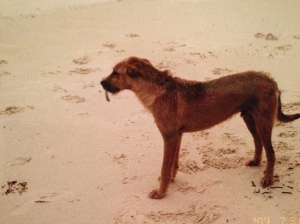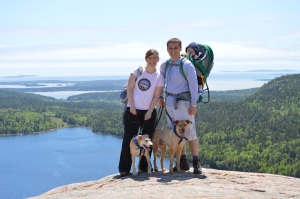Our Potcake
by Kristin Strong
On August, 2004 we arrived in Nassau, Bahamas for a much-needed vacation. Once we completed checking into our hotel, we took our first walk on beautiful Cable Beach. While walking John and I saw a couple of dogs roaming around the resort. They appeared unwell and malnourished. I later learned that the Bahamian people viewed these feral dogs as a nuisance. They would shoot or poison them. They feared their presence would drive away the tourists that provided their livelihood.
 On the second day of our vacation, I noticed one particular stray dog hanging around our hotel beach. I said, “John, do you see that dog chewing on a coconut shell? He’s so thin, and look at all the bloody sores.”
On the second day of our vacation, I noticed one particular stray dog hanging around our hotel beach. I said, “John, do you see that dog chewing on a coconut shell? He’s so thin, and look at all the bloody sores.”
John declared with a sigh, “I see. The poor pup.”
One night after dinner, we brought him some filet mignon. Careful not to scare him away, John and I approached the famished, feeble creature. He hesitated—we knew it would take time and patience to earn his trust. After a moment’s indecision, he meekly approached and delicately lifted the piece of meat from John’s hand.
He’d retreat a few safe steps away from us, then devour the meat and return for more. After he’d eaten several bites, he began dashing off with the rest to bury it in the sand.
 “Look, do you see what he’s doing?” John asked, obviously amused.
“Look, do you see what he’s doing?” John asked, obviously amused.
“He must be saving some for later.”
We nicknamed our new friend Xuma. We decided that we had to do something to help our new friend. We found a brochure for an organization, Proud Paws, run by a British Veterinarian, Dr. Peter Bizzell out of the Palmdale Veterinary Clinic in downtown Nassau. We scheduled an appointment.
 The night before the appointment we planned to keep Xuma with us. We lured him with food until he got close enough to lasso with a rope we found dangling from a life preserver. Knowing pets were not allowed in the hotel we sat outside on patio chairs until all of the guests where settled in for the night. Once the coast was clear, we whisked Xuma into our arms and snuck him into our room. Xuma slept soundly. I am sure he knew we were there to take care of him and he appeared to trust us more with each passing minute.
The night before the appointment we planned to keep Xuma with us. We lured him with food until he got close enough to lasso with a rope we found dangling from a life preserver. Knowing pets were not allowed in the hotel we sat outside on patio chairs until all of the guests where settled in for the night. Once the coast was clear, we whisked Xuma into our arms and snuck him into our room. Xuma slept soundly. I am sure he knew we were there to take care of him and he appeared to trust us more with each passing minute.
When Dr. Bizzel met us in the examination room, he took one look at Xuma and exclaimed, “You got yourselves a Potcake!”
It turned out, “Potcake” is the Bahamian term for the thick, leftover food that remains in the bottom of a pot of peas and rice after several reheatings. Traditionally, Bahamians fed potcake to the indigenous dogs that freely populated the Bahamas. Hence the dogs have come to be known as Potcakes.
As he examined Xuma, Dr. Bizzel explained that some believe the original Potcakes came to the Bahamas with the Arawak Indians from Central or South America. Until very recently, all island dogs shared the same isolated gene pool. “Potcakes are as close to nature’s perfect genotype dog as possible,” he said. “It’s an extremely unique species of canine.”
Some islands’ Potcakes look more like the typical “pariah dog” found in locales such as India and North Africa. They have smooth, short fur with little or no undercoat, cocked ears, a hound-like rib cage, and long terrier-shaped faces. More rare are the shaggy or rough-coat Potcakes but they do occur naturally. While the typical Potcake is brown, colors range from black, white, cream, yellow, and red. Adults stand about twenty-four inches high at the shoulder. Normal adult weight in the bush is about thirty-five pounds. Healthy, homed Potcakes can weigh anywhere from forty-five to fifty-five pounds. They have distinct characteristics of size and temperament. The Royal Bahamian Potcake is now a recognized breed in The Bahamas.
Dr. Bizzel vaccinated, dewormed, and treated Xuma for sarcoptic mange. We also had him neutered. Dr. Bizzel determined that he was around seven to nine months old. He only weighed twenty-four pounds.
John asked, “What will become of him now?”
“You have two options,” Dr. Bizzel said. “Either release him back to the island or take him home with you.”
“Fly him back to the U.S.?” John asked, bewildered. It sounded like an impossible journey.
Dr. Bizzell responded with certainty, “Sure, no problem. I’ll have Jackie help you with the paperwork.”
Off we went with his assistant, Jackie, to the Bahamas Board of Health to complete the paperwork to take Xuma home. We had to purchase a crate. We thought we had a setback when we learned that Xuma couldn’t travel on the same airplane home with us. Our airline only flew turbo prop planes into the islands, and it would be too hot in the cargo area for a live animal. He’d have to fly on a different airline, so we bought him his own an airline ticket
When the day arrived for us to fly home we took Xuma to his check-in counter. Before placing him in the crate, I bent down next to him. I hadn’t realized how attached I’d gotten until I thought about how frightened he’d be alone in the belly of the plane. I felt tears on my cheeks and whispered in his ear, “You be a good boy, Xuma. I promise John and I will be there for you once you arrive in Philadelphia.”
Xuma was already visibly terrified by the airport, and so could offer no alleviation to our own anxiety. I put Xuma in the crate, closed the door, turned, and walked away.
“Just focus on the moment when we’ll be reunited,” John said. “We’re doing the right thing, Kristen.”
The flight arrived in Philadelphia right on time. We were elated to be reunited with our Xuma! We couldn’t wait to get him home to introduce him to our other dog, Buddy. In time, they would become the best of buddies.
 The first month, he nearly doubled his weight, and his fur eventually grew back. Sometimes we still observe his survival instinct. Just like on that sandy beach when Xuma buried the steak, he will, on occasion bury a treat in our back yard. His prey drive still run deep in his veins; there’s rarely an opportunity for wild vermin to make it out of our yard alive. One of our favorite pastimes is to take the dogs hiking. Xuma with his inbred and intuitive nature will always lead us to the simplest and safest way up and down the mountain.
The first month, he nearly doubled his weight, and his fur eventually grew back. Sometimes we still observe his survival instinct. Just like on that sandy beach when Xuma buried the steak, he will, on occasion bury a treat in our back yard. His prey drive still run deep in his veins; there’s rarely an opportunity for wild vermin to make it out of our yard alive. One of our favorite pastimes is to take the dogs hiking. Xuma with his inbred and intuitive nature will always lead us to the simplest and safest way up and down the mountain.
Only two weeks after we brought Xuma home Nassau was hit with an intense hurricane. We often wonder had we not brought Xuma home if we would have survived the storm.
 We feel blessed to have found him. We know that fate brought us together that day will be forever grateful. We all live happily together, myself, John, Buddy, and our son, born after we brought Xuma home, Patrick.
We feel blessed to have found him. We know that fate brought us together that day will be forever grateful. We all live happily together, myself, John, Buddy, and our son, born after we brought Xuma home, Patrick.
Potcakes are an excellent choice for people who want to share their lives with an intelligent, quick-witted, and bonded companion. They’re graceful runners, intuitive, empathetic, and the right match for someone who wants a long-term, interactive relationship with another intelligent species.

Great story of chance, compassion and love for our four legged friends..
One lucky dog !!
What a great story!!!!! Such compassionate people that took the time to care for what turned out to be a great companion!!!! He came to them for a reason. Happy ending for all!!! 😃
I remember the time we spent running around the island getting Xuma ready for his life changing flight!! I just wish there were more people in the world who can help these poor potcakes – its a heartbreaking thing to see them half starved, ill and suffering. Many of us residents drove around with bags of dog food to be able to feed them! One of the worst things I witnessed was a poor young female dog basically running from a pack of male dogs but each time she stopped she was mounted by one of them. Proud Paws is a non-profit organization that spays/neuters the potcakes to prevent this constant breading. This year they worked with a worldwide group of vets and carried out a massive program to spay and neuter as many animals as they could – FANTASTIC!!! Bottom line tho is that the Bahamian people have no respect for animals and until this changes the abuse, abandoning and breeding is going to continue – Proud Paws goes into the schools to attempt to educate the Bahamian children that this is not how animals should be treated and that they are living breathing creatures who deserve respect and care. Dr Bizzell was also fighting hard to have laws put into place that protected the animals and allowed prosecution for abuse etc – I lived there for 13 years and am not sure if anyone has ever actually been prosecuted tho animal abuse continues to be rampant not only with the potcakes but also the tourist buggy pulling horses etc. Its a very very sad situation that throughout the islands the people simply have no love or respect for these animals……………………………………………heartbreaking! Of course not all Bahamians are this way – there are some who share our love of all creatures!!!
Thank you for responding, Jak. I have included a link to “Proud Paws,” for any of our readers that would like to donate. http://www.proudpaws.org/
One less homeless pup – fantastic!!!! Thank heaven for people like this!
I am so thrilled at the response to this story. During a private lesson with John & Kristen to assist them with training Buddy & Xuma they shared their story. I could not wait to share it with our BCI readers, I knew it would touch your heart as much as it did mine! Thank you again, John & Kristen.
what a wonderful story and a very lucky pup!